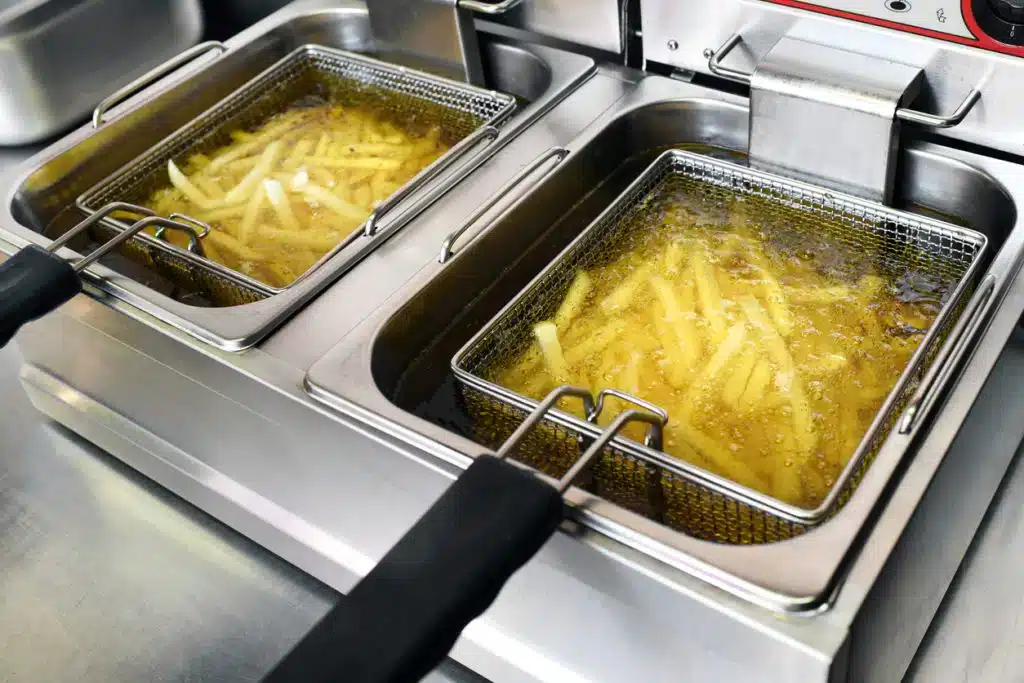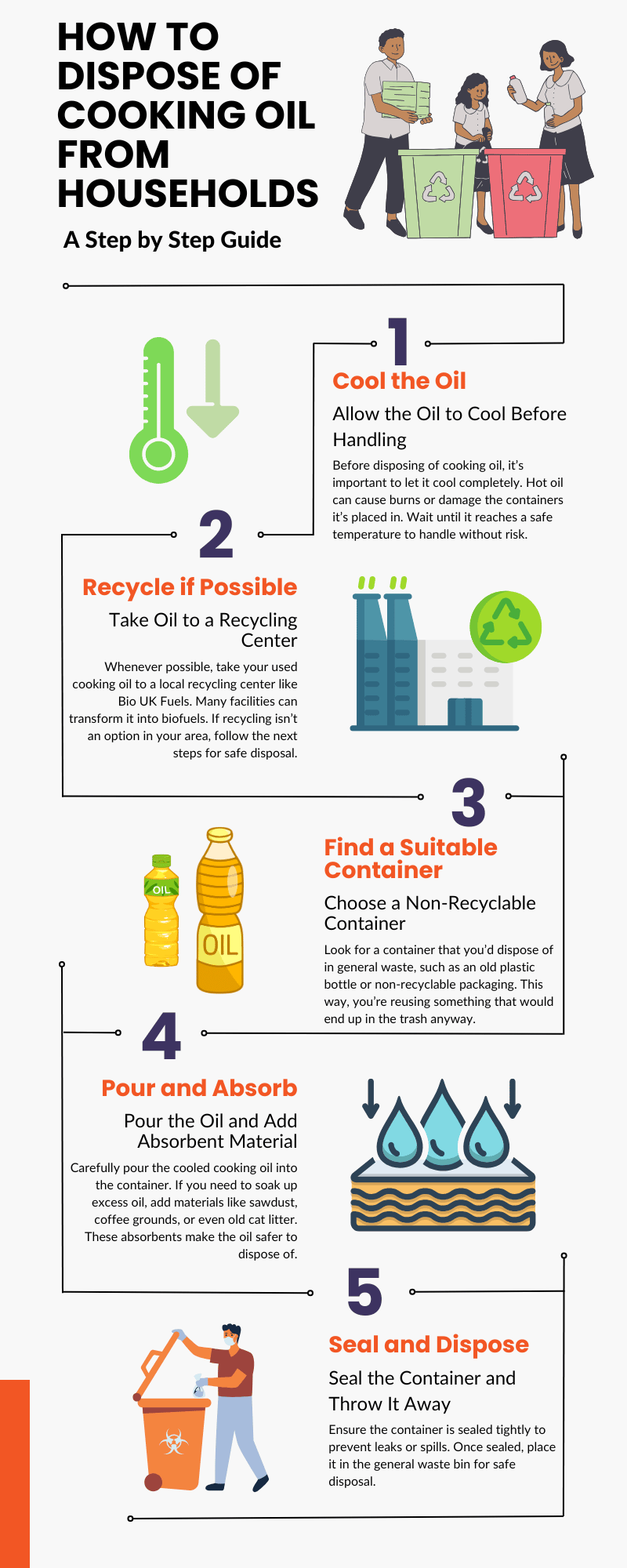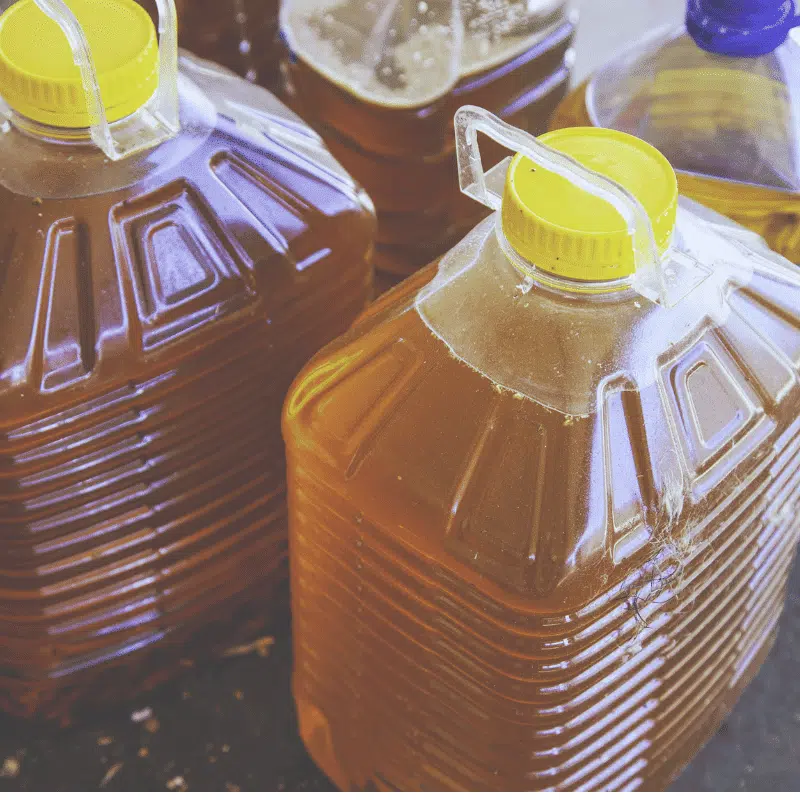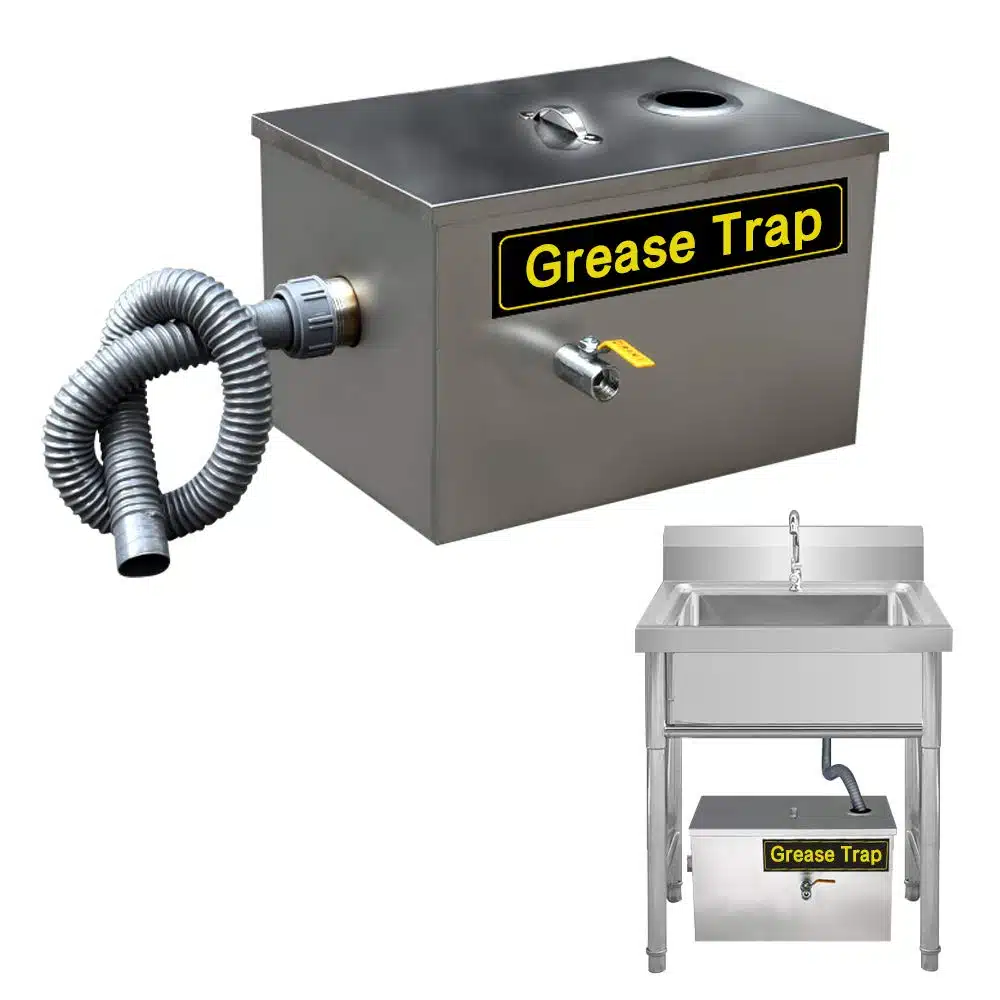

Quick Answer
Never pour cooking oil down the sink. For small amounts at home, let it cool completely, transfer to a sealed container, and place it in your general waste bin. For larger quantities (60+ litres), use a licensed collection service like Bio UK Fuels for free recycling into biodiesel. Businesses must use authorized waste carriers by law under the Food Safety Act 1990.
Disposing of used cooking oil correctly protects your drains, saves money, and helps the environment. Whether you’ve just finished frying chips at home or you’re managing a busy restaurant kitchen, knowing how to handle waste cooking oil properly is essential.
In this comprehensive guide, we’ll cover everything you need to know about cooking oil disposal in the UK, including the legal requirements for businesses, the best household disposal methods, and why recycling your used oil is the most sustainable option.
Why You Should Never Pour Cooking Oil Down the Drain
This is the single most important rule of cooking oil disposal, and it applies to everyone.
The Fatberg Problem
When cooking oil, fat, and grease (known as F.O.G.) go down your drain, they cool and solidify in the pipes. Over time, these fats combine with other items like wet wipes, creating massive blockages called “fatbergs.”
The consequences are serious:
- Blocked household drains leading to expensive plumber callouts (typically £80-£200+)
- Foul odours from your sink and drains
- Sewer flooding affecting entire neighbourhoods
- Environmental pollution when sewage overflows into rivers and streams
- Massive removal costs for local councils (the Whitechapel fatberg cost £400,000 to remove)
In 2017, workers discovered a 130-tonne fatberg under Whitechapel, London – it was the size of 11 double-decker buses and took nine weeks to remove. Thames Water reports dealing with around 75,000 sewer blockages every year, with the majority caused by fats, oils, and grease.
Yorkshire Water has raised particular concerns during the Christmas period, when household oil contamination peaks as families cook more roasts and fried foods.
Why Boiling Water Doesn’t Work
Many people believe pouring boiling water down the drain after oil will prevent blockages. This is a myth.
Hot water only temporarily liquefies the oil. As soon as it cools further down your pipes or in the sewer system, the oil solidifies again, often creating a blockage beyond your property where it becomes the council’s (expensive) problem.
If You’ve Already Poured Oil Down the Sink
Don’t panic. Pour some washing-up liquid and bicarbonate of soda down the drain, but be aware this is only a temporary fix. For persistent blockages, you’ll need to remove the pipework under your sink and physically clear the solidified oil with kitchen towels.
How to Dispose of Cooking Oil at Home: 6 Safe Methods
For domestic households using small volumes of cooking oil, you have several safe disposal options. Always start with the most environmentally-friendly method where possible.


Choosing the Right Method
The best disposal method depends on the quantity of oil you’re dealing with and your local facilities. Here are your options, ranked from most to least environmentally friendly:
- Recycle at your local centre
- Cool, contain, and bin
- Freeze until solid
- Absorb with paper towels
- Mix with absorbent materials
- Ask your local restaurant
1. Recycle at Your Local Centre
Why this is best: Recycling cooking oil turns it into biodiesel, reducing fossil fuel dependency and cutting carbon emissions by approximately 88% compared to regular diesel.
How to do it:
- Allow the oil to cool completely (wait at least 2-3 hours)
- Pour cooled oil into a clean plastic or glass bottle
- Seal the lid tightly
- Take to your local Household Waste Recycling Centre (HWRC)
💡 Top Tip
Most UK recycling centres accept cooking oil in dedicated collection points. Contact your local council to confirm they accept cooking oil and check opening times. Some councils even provide special cooking oil collection containers.
2. Cool, Contain, and Bin
Best for: Small quantities from frying bacon, stir-fries, or shallow frying
How to do it:
- Let the oil cool completely until it’s solidified or safe to handle
- Pour into a sturdy, non-recyclable container with a secure lid:
- Empty milk cartons
- Takeaway containers with lids
- Old plastic bottles
- Jam jars (though glass is heavier for bin collection)
- Seal the container tightly to prevent leaks
- Place in your general household waste bin
Important
Never use recyclable containers, as oil contamination makes them unsuitable for recycling.


Proper storage of waste cooking oil in sealed containers before disposal or collection
3. Freeze or Refrigerate Until Solid
Best for: Oils and fats that solidify when cold (animal fats, coconut oil, lard)
How to do it:
- Pour cooled oil into a disposable container
- Place in the fridge or freezer until completely solid
- Once solid, scoop or push the hardened oil directly into your bin
- Wipe the container clean and recycle or reuse it
This method prevents liquid leaks in your bin and works particularly well for bacon grease and other cooking fats.
4. Absorb with Paper Towels
Best for: Oil residue in frying pans, tiny spills, or bacon fat
How to do it:
- Let the pan cool slightly (but while oil is still liquid)
- Wipe the oil thoroughly with paper towels or newspaper
- Dispose of the oil-soaked paper in your general waste bin
- Wash the pan as normal
This is the quickest method for minimal amounts but isn’t practical for larger quantities.
5. Mix with Absorbent Materials
Best for: Medium amounts of oil when you want extra leak protection
How to do it:
- Pour cooled oil into a disposable container
- Add absorbent material:
- Cat litter (non-clumping works best)
- Sand
- Sawdust
- Shredded newspaper
- Mix until the oil is absorbed
- Seal the container and place in your general waste bin
This method provides excellent leak protection and is particularly useful if your bin isn’t collected for several days.
6. Ask Your Local Restaurant
Best for: Households with larger quantities (20-60 litres) that don’t qualify for commercial collection
Many restaurants and pubs already have waste oil collection services. They may allow you to add your household oil to their commercial collection, especially if you have a good relationship with the business.
How to do it:
- Contact local restaurants, pubs, or cafes
- Ask if you can contribute small amounts to their collection
- Store your oil in a sealed container (use the original fresh oil container if possible)
- Deliver it to them on a convenient day
When the restaurant’s oil is collected by a company like Bio UK Fuels, your household oil will be recycled into biodiesel at no cost.
Need to Dispose of 60+ Litres?
We offer free cooking oil collection and recycling for households and businesses with 60 litres or more of used cooking oil.
📞 01709 373248Book Free Collection
How to Dispose of Cooking Oil for Businesses: Legal Requirements
If you operate any business in the food industry, the rules are completely different. Business waste cooking oil disposal is tightly regulated under UK law.
The Legal Framework
Food Safety Act 1990: This Act, enforced by the Food Standards Agency (FSA), requires all food businesses to dispose of waste cooking oil through authorized channels. Failure to comply can result in:
- Substantial fines (typically £5,000-£10,000+)
- Forced closure of your business
- Criminal prosecution in serious cases
- Damage to your business reputation
Real Case Study
In 2016, a Shrewsbury restaurant was fined over £9,000 (including legal costs) for repeatedly pouring oil down sinks and blocking local sewers. This is not an isolated case – local authorities take these violations seriously.
Environmental Protection Act 1990: This establishes your “duty of care” responsibilities regarding waste. You must:
- Store waste oil securely
- Use only licensed waste carriers
- Keep waste transfer notes for at least 2 years
- Ensure oil reaches an authorized disposal or recycling facility
Local authority environmental health officers can inspect your premises at any time. If they find non-compliance, they have the power to issue improvement notices, fines, or closure orders.
Step-by-Step: Legal Disposal for Businesses
Step 1: Store Oil Correctly
Your used cooking oil must be stored in:
- Designated containers: Sealed, leak-proof containers specifically for oil
- Secure location: Away from food preparation areas
- Appropriate sizes:
- 20L cans for small cafes
- 60-200L barrels for restaurants
- 1000L IBCs for large operations
- Bulk storage tanks for major production facilities
⚠️ Critical
No oil can spill from storage containers. Any spillage can result in:
- Bad odours affecting food hygiene standards
- Pest attraction (rats, flies)
- Environmental health violations
- Slip hazards for staff
Bio UK Fuels provides leak-proof storage barrels free of charge when we complete your first collection. These can be clamped and sealed to prevent vermin access.
Step 2: Choose a Licensed Waste Carrier
You must use a waste carrier registered with the Environment Agency. This is a legal requirement, not a suggestion.
When selecting a collection service, verify they:
- Hold a valid Environment Agency waste carrier license
- Provide waste transfer notes for every collection
- Have appropriate insurance
- Can demonstrate where your oil goes for recycling or disposal
At Bio UK Fuels, we are fully registered with the Environment Agency and hold RedCert certification, ensuring all collected oil is processed sustainably.
Step 3: Arrange Regular Collections
The frequency depends on your oil usage:
- Small cafes: Monthly or quarterly
- Busy restaurants: Weekly or fortnightly
- Large production kitchens: Multiple times per week
Never let oil overflow from containers. Plan collections before you reach capacity, leaving some buffer room.
Step 4: Obtain Waste Transfer Notes
Every collection must be documented with a waste transfer note. This legal document proves:
- When the oil was collected
- How much was collected
- Who collected it (the carrier)
- Where it’s going
You must keep these notes for at least 2 years. Environmental health inspectors will ask to see them during inspections.
Bio UK Fuels provides all necessary documentation with each collection, and we can supply storage barrels during your first pickup.


A grease disposal system helps commercial kitchens manage waste oil hygienically
Commercial Kitchen Grease Disposal Systems
For businesses producing significant amounts of oil and grease, installing a grease disposal system is highly recommended.
✓ Benefits
- Convenient, hygienic storage until collection
- Prevents spills, leaks, and odours
- Often includes grease traps to catch FOG
- Reduces pest attraction
- Demonstrates compliance during inspections
System Features
- Collection receptacle with secure lid
- Drainage point for easy filling
- Capacity indicators
- Optional grease trap integration
Contact Bio UK Fuels to discuss the right system for your business.
Business Collection Services
Free waste oil collection for businesses of all sizes. Fully licensed, documented, and environmentally responsible.
📞 01709 373248Arrange Collection Email Us
Can You Reuse Cooking Oil?
Yes! Reusing cooking oil is the most environmentally friendly option, reducing waste and saving money.
How to Reuse Cooking Oil Safely
- Strain the oil: After cooking, let the oil cool slightly and strain it through a coffee filter, cheesecloth, or fine-mesh strainer to remove food particles
- Store properly: Pour the strained oil into a clean, airtight container (glass jars work best)
- Label clearly: Write the date and type of oil on the container
- Store in a dark place: Keep away from light and heat to prevent degradation
- Monitor quality: Check the oil before each use
How Many Times Can You Reuse Cooking Oil?
Generally, cooking oil can be reused 2-3 times, but this depends on:
- What you cooked (fish oil degrades faster than vegetable oil used for chips)
- The cooking temperature (higher temps degrade oil faster)
- How well you strained it
When to Dispose of Reused Oil
Stop using oil and dispose of it when you notice:
- Dark color: Fresh oil is golden; used oil darkens
- Thick, sticky texture: Degraded oil becomes viscous
- Rancid smell: A sour, unpleasant odor means the oil has spoiled
- Excessive foaming: When heated, old oil foams more than fresh oil
- Smoke at lower temperatures: Degraded oil has a lower smoke point
Using spoiled oil is harmful to health and affects food taste, so when in doubt, throw it out (properly).
What Happens to Recycled Cooking Oil?
When you recycle cooking oil through a licensed collector like Bio UK Fuels, it undergoes an amazing transformation.
The Recycling Process
- Collection: Oil is collected in low-emission transport vehicles
- Transportation: Delivered to the nearest processing facility
- Cleaning: Oil is filtered to remove food particles and impurities
- Testing: Quality checks ensure the oil meets processing standards
- Chemical conversion: Through transesterification, the oil is converted into biodiesel
- Distribution: The finished biodiesel is sold for various applications
Uses of Recycled Cooking Oil (Biodiesel)
Biodiesel made from cooking oil can power:
- Vehicle engines: Cars, vans, lorries, and buses
- Electricity generation: Backup generators and grid power
- Manufacturing machinery: Factory equipment and industrial processes
- Heating systems: Commercial and industrial heating
Environmental Benefits
- 88% reduction in carbon emissions compared to fossil fuel diesel
- Reduces dependence on fossil fuels
- Diverts waste from landfills
- Supports the circular economy
For every litre of used cooking oil collected, approximately one litre of biodiesel can be produced. This is why recycling your oil matters.
Bio UK Fuels transforms collected waste oil into usable biodiesel, which we retail from our depot in Sheffield, creating a truly sustainable loop.
Common Cooking Oil Disposal Mistakes to Avoid
Even with good intentions, many people make these errors:
❌ Mistake 1: Pouring Oil Down the Drain
Why it’s bad: Creates fatbergs, blocks pipes, causes environmental damage, results in expensive repairs
Do instead: Use any of the safe disposal methods above
❌ Mistake 2: Disposing When Still Hot
Why it’s bad: Risk of burns, can melt plastic containers, may cause fires if mixed with flammable materials in the bin
Do instead: Always wait until oil is completely cool (at least 2-3 hours)
❌ Mistake 3: Using Recyclable Containers
Why it’s bad: Oil contamination makes entire recycling batches unusable, defeating the purpose of recycling programs
Do instead: Only use non-recyclable containers or dedicated oil bottles
❌ Mistake 4: Ignoring Local Council Guidelines
Why it’s bad: Different councils have different collection points and schemes; you might miss free recycling options
Do instead: Check your local council website or call them to understand local oil disposal options
❌ Mistake 5: Not Keeping Records (Businesses)
Why it’s bad: Legal requirement to keep waste transfer notes; failure means fines during inspections
Do instead: File all waste transfer notes and keep them for at least 2 years
❌ Mistake 6: Reusing Oil Too Many Times
Why it’s bad: Degraded oil is unhealthy, tastes bad, and can produce harmful compounds when heated
Do instead: Monitor oil quality and dispose when it shows signs of degradation
❌ Mistake 7: Pouring Oil Outside
Why it’s bad: Harms soil, kills plants, attracts pests, can contaminate groundwater, damages the environment
Do instead: Always contain oil in sealed containers and dispose properly
Cooking Oil Disposal Methods Comparison
| Method | Best For | Pros | Cons |
|---|---|---|---|
| Recycling Centre | Any quantity | Most eco-friendly, free, becomes biodiesel | Requires transport to centre |
| Cool & Bin | Small amounts (<1L) | Convenient, quick | Goes to landfill |
| Freeze Solid | Fats that solidify | Prevents leaks, clean disposal | Takes time, requires freezer space |
| Paper Towel | Tiny amounts | Very quick, minimal effort | Only works for traces |
| Absorbent Material | Medium amounts | Extra leak protection | Requires materials on hand |
| Licensed Collection | 60L+ or businesses | Free for qualifying amounts, legally compliant | Minimum quantity required |
Frequently Asked Questions About Cooking Oil Disposal
Can I pour cooking oil down the toilet?
No. The toilet connects to the same sewer system as your sink. Pouring oil down the toilet causes the same blockage problems and fatberg formation. Always dispose of oil using the proper methods outlined above.
Can cooking oil go in the compost?
Small amounts of vegetable-based cooking oil can be added to compost, but only in very limited quantities (a few tablespoons max). Too much oil will attract pests (rats, foxes), create anaerobic conditions, slow down decomposition, and cause foul odours. It’s better to recycle or bin the oil instead.
Can I put cooking oil in my food waste bin?
No. Most council food waste collections do not accept liquids, including cooking oil. It can contaminate other food waste and cause issues at processing facilities. Tiny amounts of oil on food scraps (like salad dressing residue) are acceptable, but not significant quantities of liquid oil. Always check your local council guidelines.
How long can I store used cooking oil before disposal?
If properly stored in a sealed, airtight container in a cool, dark place, used cooking oil can be stored for several months before disposal. However, for hygiene and safety reasons, dispose of it as soon as convenient. If you’re storing it to reuse, check the quality before each use.
Does olive oil block drains like other oils?
Yes. All cooking oils, including olive oil, coconut oil, vegetable oil, sunflower oil, and animal fats, will solidify and block drains. The type of oil doesn’t matter – never pour any oil down the sink.
Can I burn old cooking oil?
No. Burning cooking oil produces toxic fumes, creates a fire hazard, and is illegal in most areas. Always use approved disposal methods outlined in this guide.
Will my home insurance cover drain blockages from oil?
Most home insurance policies do not cover drain blockages caused by improper disposal of oil, as this is considered preventable damage. Always check your policy, but it’s best to avoid the problem entirely by disposing of oil correctly.
How many times can you reuse cooking oil?
Generally 2-3 times, depending on what you cooked, the cooking temperature, and how well you strained it. Stop using oil when it becomes dark, thick, smells rancid, foams excessively, or smokes at lower temperatures. Degraded oil is unhealthy and affects food taste.
Where can I recycle cooking oil near me?
Most Household Waste Recycling Centres (HWRCs) in the UK accept cooking oil. Contact your local council to find your nearest centre and confirm they accept cooking oil. Some areas also have dedicated cooking oil collection banks at supermarkets or community centres.
What quantity of oil qualifies for free collection?
Bio UK Fuels offers free collection for households and businesses with 60 litres or more of used cooking oil. For smaller amounts, use your local recycling centre or the household disposal methods outlined above. Businesses of any size producing waste cooking oil must use licensed collection services regardless of quantity.
Regional Variations in Cooking Oil Disposal Across the UK
While the basic principles apply everywhere, different regions have specific collection schemes and regulations.
🏴 England
- Most local councils accept cooking oil at HWRCs
- Thames Water runs “Bin It – Don’t Block It” campaign
- London councils often have dedicated oil banks
🏴 Scotland
- Many councils provide free oil collection containers
- Zero Waste Scotland promotes oil recycling
- Some areas have door-to-door collection trials
🏴 Wales
- Welsh Government supports oil recycling schemes
- Focus on preventing FOG-related sewer blockages
- Active promotion of oil-to-biodiesel conversion
Northern Ireland
- Collection available at most civic amenity sites
- NI Environment Agency enforces regulations
- Growing network of community collection points
Always check with your local council for specific guidance in your area.
The Environmental Impact of Proper Oil Disposal
Disposing of cooking oil responsibly makes a genuine difference to the environment.
Protecting Waterways and Wildlife
When cooking oil enters rivers, lakes, and streams:
- It floats on the surface, blocking oxygen and sunlight from entering the water
- Plants cannot photosynthesize without sufficient light, leading to plant death
- Fish and aquatic animals suffocate due to reduced oxygen levels
- Entire ecosystems collapse when the base of the food chain is destroyed
An estimated 500,000 tonnes of fats, oils, and grease end up in the UK sewer network each year, with a significant portion eventually reaching waterways.
Reducing Carbon Emissions
Recycling cooking oil into biodiesel significantly reduces greenhouse gas emissions:
Carbon Savings Comparison
- Fossil fuel diesel: Baseline
- Crop-based biofuels: 50-60% reduction
- Used cooking oil biodiesel: 88% reduction
This makes waste cooking oil one of the most effective renewable energy sources available.
Supporting the Circular Economy
Proper oil disposal and recycling demonstrates the circular economy in action:
- Oil is used for cooking food
- Used oil is collected (not wasted)
- Oil is processed into biodiesel
- Biodiesel powers vehicles and machinery
- Carbon emissions are reduced
- Less fossil fuel is extracted
By recycling your cooking oil, you’re actively participating in this sustainable cycle.
Book Your Free Cooking Oil Collection with Bio UK Fuels
Whether you’re a business producing waste cooking oil or a household with 60+ litres to dispose of, Bio UK Fuels makes recycling easy, legal, and free.
✓ Fully licensed – Registered with the Environment Agency
✓ RedCert certified – Guaranteeing sustainable processing
✓ Free collection – No cost for qualifying quantities
✓ Complete documentation – Waste transfer notes provided every time
✓ Nationwide service – Weekly routes covering the UK
✓ Environmental commitment – Every litre becomes biodiesel
Contact Us
📞 01709 373248Mobile: 07590 505601 | 07970 276193
Email: [email protected]
Opening hours: Monday-Friday, 9:00 AM – 5:00 PM
Conclusion: Proper Cooking Oil Disposal Matters
Disposing of cooking oil correctly is simple, but the impact is significant. By following the guidance in this article, you:
- Protect your drains from expensive blockages
- Save local councils thousands in sewage system maintenance
- Prevent environmental damage to waterways and wildlife
- Support renewable energy through biodiesel production
- Comply with the law if you’re a business
- Reduce carbon emissions by 88% through recycling
The Rules Are Straightforward:
- Never pour oil down sinks, drains, or toilets
- Households: Cool, contain, and bin small amounts; recycle larger quantities
- Businesses: Use licensed waste carriers and maintain waste transfer notes
- Everyone: Choose recycling when possible for maximum environmental benefit
If you have any questions about cooking oil disposal or want to arrange a free collection, contact the Bio UK Fuels team. We’re here to make responsible oil disposal easy and accessible for everyone.
Last Updated: October 2025
About Martin Simpkins
Martin Simpkins is a dedicated business professional with hands-on experience in operations, fuel supply management, and client service within the UK energy sector. Through his role at Bio UK Fuels, he has been involved in daily business operations, customer coordination, and ensuring smooth delivery of fuel services to commercial clients.
Martin’s work reflects strong organisational skills, a practical approach to problem-solving, and a focus on maintaining reliable business relationships. Colleagues and partners know him for his steady communication style and his commitment to keeping projects running efficiently.


